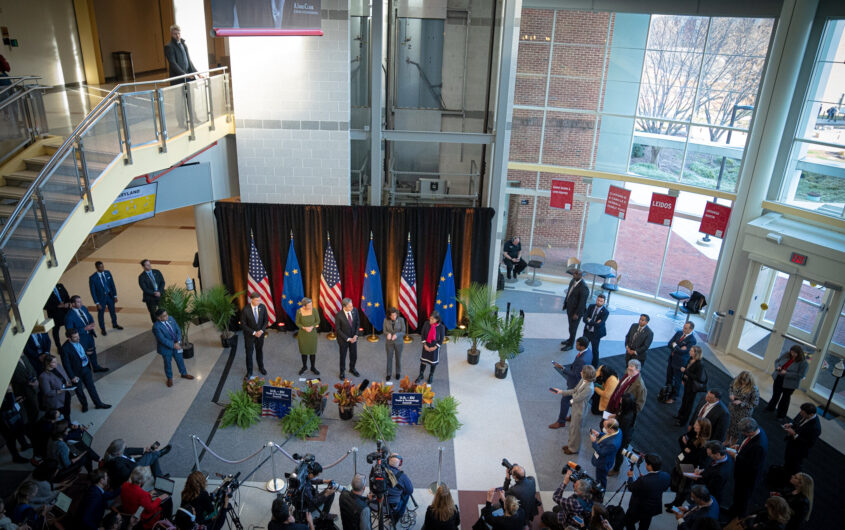
U.S. Department of State via Flickr
The Transatlantic Economy in an Election Year

Peter S. Rashish
Vice President; Director, Geoeconomics Program
Peter S. Rashish, who counts over 30 years of experience counseling corporations, think tanks, foundations, and international organizations on transatlantic trade and economic strategy, is Vice President and Director of the Geoeconomics Program at AICGS. He also writes The Wider Atlantic blog.
Mr. Rashish has served as Vice President for Europe and Eurasia at the U.S. Chamber of Commerce, where he spearheaded the Chamber’s advocacy ahead of the launch of the Transatlantic Trade and Investment Partnership. Previously, Mr. Rashish was a Senior Advisor for Europe at McLarty Associates, Executive Vice President of the European Institute, and a staff member and consultant at the International Energy Agency, the World Bank, UNCTAD, the Atlantic Council, the Bertelsmann Foundation, and the German Marshall Fund.
Mr. Rashish has testified before the House Financial Services Subcommittee on International Monetary Policy and Trade and the House Foreign Affairs Subcommittee on Europe and Eurasia and has advised three U.S. presidential campaigns. He has been a featured speaker at the Munich Security Conference, the Aspen Ideas Festival, and the Salzburg Global Seminar and is a member of the Board of Directors of the Jean Monnet Institute in Paris and a Senior Advisor to the European Policy Centre in Brussels. His commentaries have been published in The New York Times, the Financial Times, The Wall Street Journal, Foreign Policy, and The National Interest, and he has appeared on PBS, CNBC, CNN, NPR, and the BBC.
He earned a BA from Harvard College and an MPhil in international relations from Oxford University. He speaks French, German, Italian, and Spanish.
This year will see elections in both the United States (the White House and Congress) and the European Union (the European Parliament and indirectly the next President of the European Commission). As voters go to the polls, to what extent should the electoral calendar determine what is on the agenda of cooperation between the two economies? This question is of central importance ahead of next week’s meeting in Washington of the U.S.-EU Trade and Technology Council (TTC), its fifth since being launched in 2021.
A temptation to play it safe would be understandable. And in some areas, that would also be wise. The decision to put off negotiations until 2025 on a Global Arrangement on Sustainable Steel and Aluminum (GASSA) that would permanently remove Trump-era national security tariffs on EU exports of these two metals is the better part of valor. One of the top five locations for steel production in the United States is Pennsylvania—a swing state that both President Biden and Donald Trump, his likely opponent, will be vying for with intensity before November’s election. Steel is simply too political an issue to negotiate during a fraught electoral season.
The same is true for trade policy more generally. The United States, especially, needs something akin to a national debate on the value of U.S. engagement in the global economy.
Since at least Trump’s successful 2016 presidential campaign that vilified both free trade in the abstract and the particular deals negotiated by his predecessors, the public discourse on trade policy has been dominated by narratives more than strategies. These can be destructive ones, for example when President Trump wrongly declared that “trade wars are good, and easy to win.” While the Biden administration’s positive message about putting a “vibrant middle class” at center stage is welcome, it does not reveal a vision of what the global economy of the future should look like at a time when its 75-year-old institutions and norms are showing their age.
The involvement of the legislatures in both Washington and Brussels would help ensure the TTC’s longevity independent of whoever is at the helm in the White House or the Berlaymont.
But even with the politically neuralgic nature of trade policy, the TTC meeting next week can signal what is at stake for the United States and the European Union in a changing international economic order. One way to do this would be to announce a commitment to establishing a U.S. Congress-European Parliament leadership group on the future of the transatlantic trade and technology relationship. The involvement of the legislatures in both Washington and Brussels is missing from the current structure of the TTC and would help ensure its longevity independent of whoever is at the helm in the White House or the European Commission president’s office in the Berlaymont.
In retrospect, the failure in 2016 of the United States and the European Union to successfully conclude their negotiations toward a Transatlantic Trade and Investment Partnership (TTIP) was a crucial missed opportunity. That agreement was a forward-looking one—much more about setting common high-standard rules for the global economy faced with the challenge from China and a deadlocked World Trade Organization than about reducing tariffs. TTIP would have required the approval of both the U.S. Congress and the European Parliament and so provided the insulation from the political whims of the day that the U.S.-EU relationship needs given its still agenda-setting role in the global economy.
The European Union, for its part, continues to negotiate traditional trade agreements like TTIP, including a deal with the four Mercosur countries in South America (Argentina, Brazil, Paraguay, Uruguay) that would among other things helpfully dispel the notion that there are irreconcilable differences of interest between economies on either side of some GDP per capita dividing line.
But big, binding free trade agreements are far from the only—or even the best—way forward. Especially during a period of mutation in the global economy, flexibility and a spirit of experimentation—something the TTC encapsulates—are essential. Support from U.S. and EU legislators would help provide stability and staying power to these efforts.









